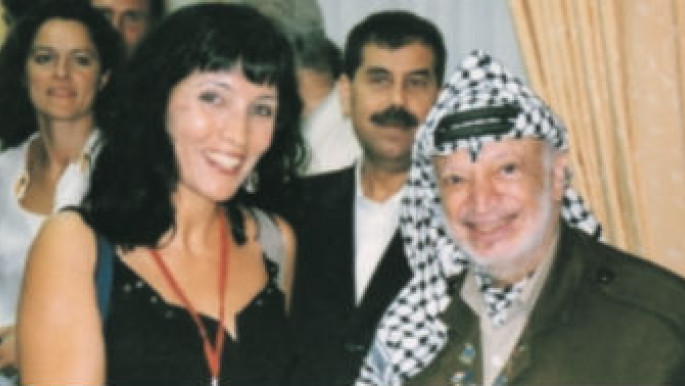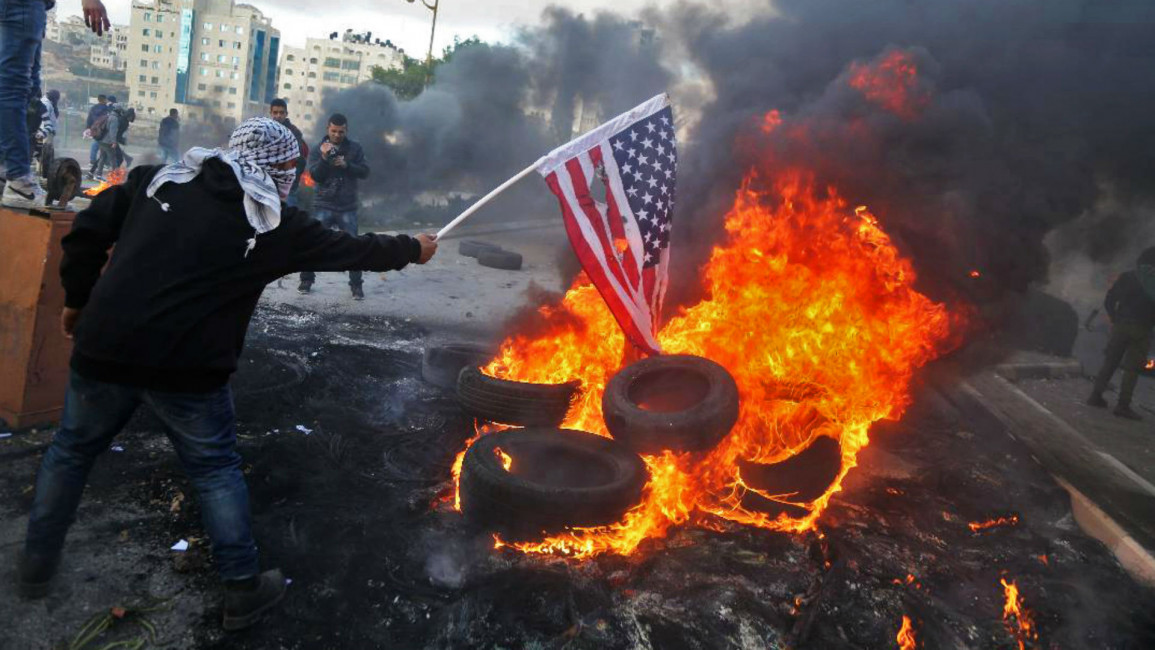
O Jerusalem - bringing on the apocalypse in a theme park
As world leaders play political chess with Jerusalem, and all eyes are on Israel and Palestine, I admit to a certain nostalgia.
All the news footage of Damascus Gate has made me fondly recall my first visit there in 1994, in the still euphoria-tinged post-Oslo accord days.
This was a time when people still spoke hopefully of joint Israeli-Palestinian ventures, of a peace and prosperity-filled future. A time before the assassination of Rabin, before the massive expansion of illegal settlements that all but nullified hope of a two state solution. A time before Bible-thumping evangelical Mike Pence told some of the world's oldest Christian communities that making Jerusalem the eternal Jewish capital was "God's will".
I was 26 then, a young an idealistic journalist who jumped at the chance to attend a conference on new Palestinian media and escape the confines of my damp London flat for springtime in Jerusalem.
Ten days of visits to (pre-Hamas) Gaza and the West Bank from the HQ of my crumbling but charming East Jerusalem hotel flew by, and before I knew it I was in a taxi headed for Ben Gurion and a return to damp London.
I'd read about "Jerusalem syndrome" and was rather sceptical about the supposed spiritual pull of the fraught and often-claustrophobic city claimed by three faiths. But just as I passed the old American Colony Hotel, something weird happened.
I noticed a gnarled old olive tree and suddenly felt an unexpected pang of connection. Leaving suddenly felt all wrong - as if I were uprooting myself from some kind of long lost homeland. Was it my Levantine roots I wondered? I did have Greek Orthodox Mussallem great-grandparents who fled Ottoman rule in what is now Lebanon for Canada - and we had some Palestinian cousins.
The feeling was still there when I arrived at Ben Gurion airport, checked in my bag and went to make some final goodbye calls at the payphone. I rang a few friends, but the only one who answered was Juan Carlos Gumucio - the legendary Bolivian correspondent for el Pais (who would meet a tragic end in 2002).
When I told him I was at the airport he said: "No! you can’t leave now. The Chairman's coming!" The world's press corps had descended on Jerusalem, not to witness a potential Trump-fuelled Armageddon, but to welcome Arafat home.
"But where will I stay?" I protested. "Come to my place, I have a spare room," he insisted. I was naïve enough to accept this offer at face value. "But what about my bag, it's already checked in!" "Well go and ask for it back," he said.
Somewhat unfeasible in today's post-9/11 world, this was actually still possible back then.
And so, with minimal persuasion, I decided to ask for my bag back, from an oddly non-plussed Israeli woman soldier. "I've changed my mind," I said.
But how to get back to East Jerusalem late at night? It was now nearing midnight. Suddenly a religious Jewish woman walked by and, mistaking me for a nice Jewish girl abroad, asked me, in a heavy Queens accent, if I needed any help.
"I need to get back to Jerusalem," I told her. She quickly introduced me to a friend who was driving a van back into the city. His name was David and he went on an anti-Palestinian rant for most of the ride, which was helpful as it gave him less chance to ask any probing questions. Until we neared the city and he asked again for Juan Carlos' address.
"East Jerusalem?" he asked, incredulous. And then, without missing a beat: "You are Jewish, aren't you?"
"Ummm… I'm Canadian," I replied. He ended his rant abruptly and promptly dropped me off at the old villa Juan Carlos had rented. It turned out there was no spare room, so I wisely chose the sofa.
 |
|
| The author meets Arafat, 2004 [Supplied] |
The next day I found more comfortable lodging with two German academics who lived in the Old City, in a building recently occupied by American settlers. I met one in the hallway and he asked me where I was from. "Vancouver," I replied. "Well, welcome home," he beamed, taking me for a true believer.
After a week I had a job - writing for the first joint Israeli-Palestinian monthly magazine in English - named the New Middle East. Published by Hana Signora, it was jointly edited by Erwin Frenkel - formerly of the Jerusalem Post, pre-Conrad Black - and Maher Abu Khatr - of el Fajr.
And I found a new home. I rented a tiny limestone house within the confines of a Greek Orthodox convent off the Via Dolorosa. The elderly Palestinian man who rented it to me for $300 a month lived across the way in slightly larger limestone house with his wife. "If anyone asks," he advised, "just tell them you're my cousin."
The little house hugged the edge of the old city wall and featured a fridge, a stove, and a large poster of the Virgin Mary over a decidedly single bed. It was surrounded by jasmine bushes that enveloped the two rooms every evening with sweet fragrance. In the morning I awoke to the sound of church bells ringing.
Living in the old city and working in West Jerusalem was a trip and a half. At one point, when East Jerusalem stayed on Jordanian time and the West went to daylight savings time, they were even in different time zones. The walk to work should have taken at most 20 minutes, but as the shopkeepers along the way learned my name, it could take an hour, as I had not learned how to refuse their kind offers of kahwheh and conversation.
Identity politics, I learned, was a hat trick - quite literally. If I wore my Panama hat, together with my long cotton dress and sandals, I was mistaken for a religious Jewish woman (and oddly often hit on by Orthodox Jewish men when I walked to the local swimming pool on Saturdays). Without the hat, and wearing a scarf around my neck, I was greeted in Arabic. Wearing the wrong thing on the wrong street could be problematic - but never fatal.
 |
For while it all felt quite euphoric, utopian even, to my 26-year-old self. But soon, things began to get darker. |  |
At the office I'd have long conversations with Maher - who had Jerusalem ID - about the future of the Palestinian state. Once Erwin, a tough but principled curmudgeon with a heart of gold, came to rescue me at my limestone house when I fell ill, bringing his doctor nephew. I introduced him to my landlord and his wife served us coffee.
For while it all felt quite euphoric, utopian even, to my 26-year-old self. But soon, things began to get darker. Tensions flared as Palestinians began to realise that something was rotten in Oslo, and that the status quo was not quick to change. Eventually, I left it all behind, including my lovely limestone house, and came back to damp London. The New Middle East folded six months before Rabin was assassinated, as investors had lost confidence in the whole idea of a joint magazine venture.
I would return 10 years later on a magazine assignment to find my old editors. Illogically, like the child of divorced parents, I hoped that Erwin - now embittered and running a B&B in the Galilee - and Maher, who spent most of his time in Ramallah as his wife had West Bank ID and it was almost impossible for her to get residency in his hometown - would somehow be reunited. The best I managed was a fraught but poignant phone call.
I went to visit my old landlord at the convent. He was distraught as his children had all left the country for better futures in North and South America and he and his wife had been left alone in their limestone house.
"There is no future for them here," he told me, sadly. "We are the stones of the old city - and soon we will all be gone."
On a subsequent visit, I tried to relive a bit of the Old City magic by staying at an historic hotel near Jaffa Gate, owned by the Greek Orthodox Church and rumoured to be up for sale to Jewish settlers. But the Old City had changed. After the wall displaced whole communities it had become even more overcrowded and tense, and crime had risen dramatically amongst the no-future generation who did not have the luxury of escape to greener pastures.
In the end, the noise of patrolling Israeli tanks and a creeping sense of unease made it impossible to sleep. I made my way back to Beit Hanina just before dawn.
I think of my Old City home now, as televisual images cut its stone walls against shots of Mike Pence. I think of the parking lot on the site of Nea Maria Church, a few metres away from the Nabi Dawoud Gate.
Or the City of David theme park that offers a Hollywood version of the city's history - neatly sidestepping Muslim, Christian or Palestinian references - and burrows tunnels under Palestinian homes in the Jerusalemite neighbourhood of Silwan - so close there are cracks in people's floors.
I think of the 56 percent of Palestinians in East Jerusalem who have been cut off from the city since the building of the wall. And of the 15,000 Palestinians who have had their Jerusalem residency revoked since 1967.
I think of how deeply attached I felt to the place, especially after discovering a beit mussallem house in the Old City - home to distant cousins. I can only imagine how it must feel to be uprooted from your birthplace where your ancestors have lived for two thousand years.
Perhaps a little nostalgia is a dangerous thing and every past can easily become a reimagined golden age.
But how has it come to this, Jerusalem? An ancient heritage reduced to a Disneyfied displacement; a people adrift with their real leaders in jail, and their pretend ones reduced to televisual gestures.
So bring on the apocalypse, Mike Pence in the name of God's will and Trump's agenda, perhaps in a theme park. Bring on the four horsemen of Triumphalist Pax Americana, even as caged workers slouch back to Bethlehem after a hard day's labour. Do it at Christmas even, for full effect.
Just don't call yourself a Christian.
Oh, Jerusalem. I remember you now.
Hadani Ditmars is the author of Dancing in the No Fly Zone: a Woman's Journey Through Iraq. A former editor at New Internationalist, she has been reporting from the Middle East for two decades. Her next book, Ancient Heart, is a political travelogue of Iraqi heritage sites.
Follow her on Twitter: @HadaniDitmars



